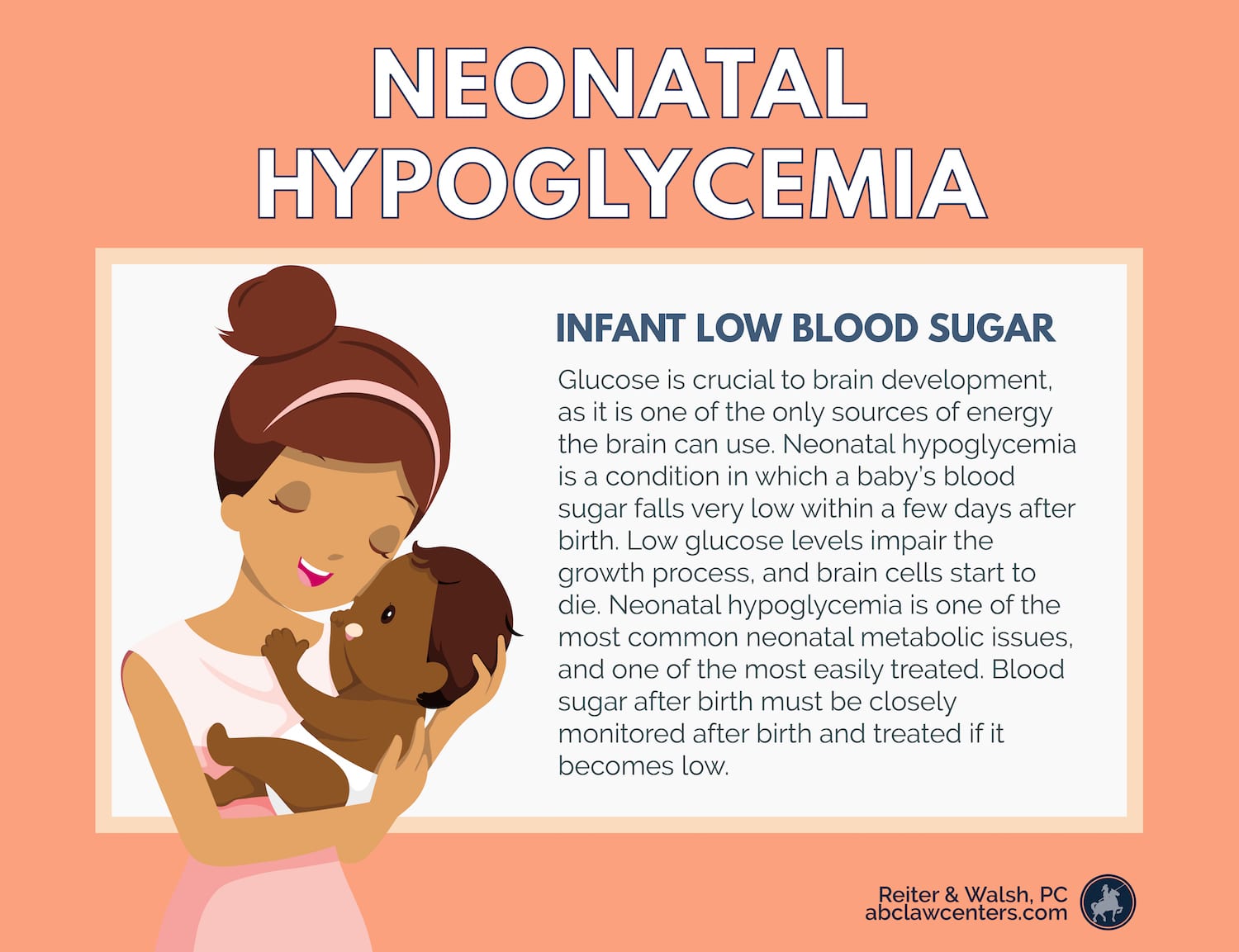Neonatal Hypoglycemia (Low Blood Sugar in Newborns)
Glucose, or blood sugar, is crucial to brain development as it is the main source of energy for the brain. Neonatal (newborn) hypoglycemia (NH) is a condition in which a baby’s blood sugar falls dangerously low within a few days of birth. Neonatal hypoglycemia is one of the most common neonatal metabolic issues and is easily treated. When a baby transitions to life outside the mother’s womb, blood glucose levels naturally drop during the first two hours after delivery. However, a baby with neonatal hypoglycemia experiences a more dramatic and prolonged drop in blood sugar than a healthy baby would. A stable level of glucose is important for organ function in a newborn baby, and the brain uses glucose almost exclusively for energy metabolism and development. Low glucose levels can impair their growth process and cause brain cells to die.

Newborn hypoglycemia is not difficult to recognize and usually easily treated. However, untreated NH can lead to serious consequences. An infant’s developing brain tissue depends on a steady supply of glucose as its main source of fuel. When a baby’s brain doesn’t receive a sufficient amount of glucose, the cells in their brain begin to die, and this can lead to permanent brain injury. Severe NH is one of the leading causes of newborn brain injury.
Signs and Symptoms
In some cases, infants with low blood sugar may not show symptoms. Routine blood tests are done following birth to check blood sugar levels. If signs and symptoms of newborn hypoglycemia do surface, they may include:
- Bluish-colored skin (cyanosis) or pale skin
- Breathing problems, such as rapid breathing (tachypnea), pauses in breathing (apnea), or a grunting sound
- Irritability or listlessness
- Loose or floppy muscles (hypotonia)
- Vomiting or poor feeding
- Weak or high pitched cry
- Tremors, shakiness, sweating, or seizures
Causes and Risk Factors
The causes of newborn hypoglycemia include:
- An excess of insulin in the baby’s blood: Insulin is a hormone that decreases the amount of glucose in the blood. When a baby has an excess of insulin, a condition such as persistent hyperinsulinemic hypoglycemia of infancy (PHHI) can occur.
- Hypoxic-ischemic encephalopathy (HIE) (birth asphyxia)
- Limited storage of glycogen: Before glucose is broken down into its simple form, it is stored in the form of glycogen. Decreased glycogen storage can happen as a result of prematurity or intrauterine growth restriction (IUGR), and can cause hypoglycemia.
- Increased glucose use: A baby may need to utilize more glucose than usual due to the following medical conditions:
- Hyperthermia (high body temperature from infection, medication, or head injury)
- Polycythemia (abnormally high red blood cell mass, which can be caused by oxygen deprivation)
- Sepsis (a bacterial infection in the bloodstream)
- Growth hormone deficiency
- Decreased glycogenolysis: A decreased breakdown of glycogen into glucose.
- Decreased gluconeogenesis: A decreased production of glucose caused by a problem with a metabolic pathway.
- Depleted glycogen stores: This can be caused by:
- Asphyxia-perinatal stress – a baby deprived of oxygen for so long during birth that damage occurs (usually to the brain).
- Starvation
Some conditions that can increase risk for NH are:
- Fetal macrosomia or intrauterine growth restriction: Babies who are unusually small or large for gestational age
- Premature birth: Babies born preterm may have poor nutrient reserves and undeveloped hormone systems that can increase their risk
- Babies who were born to diabetic mothers
- Babies who have experienced birth asphyxia (HIE) or stress in the womb
- Babies with low thyroid hormone levels (hypothyroidism)
- Babies with rare genetic disorders
Long-term Effects
If newborn hypoglycemia symptoms go undiagnosed and/or untreated for too long, there is a chance for long-term injury, including:
- Brain injury
- Cerebral palsy
- Learning disabilities
- Developmental disabilities
- Epilepsy/seizures
- Vision impairments
- Neuropsychiatry disorders
Types of Newborn Hypoglycemia
There are two different types of neonatal hypoglycemia: transient (short-term) and persistent (long-term). Babies who have transient NH typically have a deficiency of glycogen stores at birth. This is common in babies that are born premature, who are small for gestational age, or experienced birth asphyxia. Transient NH babies also may experience hyperinsulinism, which occurs most often in babies born to diabetic mothers.
Newborn hypoglycemia can also occur if an IV infusion of glucose is interrupted; for example, if the umbilical catheter is incorrectly positioned or the baby has sepsis. If the baby experiences NH due to an error of medication administration, this is medical malpractice.
Diagnosis and Treatment
When a baby shows clinical signs of having low blood glucose or the baby is at risk for hypoglycemia, a blood glucose test must be done immediately. This test should be done within minutes of any presented symptoms by sending some of the baby’s blood to the lab for analysis. If the baby has low blood sugar, then their glucose concentration should be retested every 3to 6 hours within the first 24 to 48 hours of life. Other babies with risk factors are tested routinely after birth even if they do not show signs and symptoms of hypoglycemia.
Because NH can result in brain injury if not treated properly, it is important to use aggressive therapy that includes the use of a parenteral glucose (dextrose) to increase blood glucose levels in children exhibiting symptoms. Dextrose is typically administered through an IV, and the levels are monitored and adjusted until the blood glucose level in the baby is at an acceptable concentration. If needed, treatment will be continued until the baby can maintain normal glucose levels. Babies who were born early, have an infection, or were born at a low weight may need to be treated for a longer period of time.
If IV dextrose isn’t an option for a baby with NH, glucagon can be used as a treatment and administered subcutaneously (beneath the skin) or intramuscularly (into the muscles). Glucagon can be used to treat babies who experience severe hypoglycemia and may not have dextrose available to them. Babies who have experienced NH and are not being treated with dextrose or glucagon should be fed within the first hour of life. These feedings should be done at 2 to 3 hour intervals, and blood glucose concentrations should be monitored frequently within 20 to 30 minutes after being fed. Babies who are breastfed may need supplemental formula until the mother is able to produce enough breast milk.


Get Legal Help
Early diagnosis and treatment of newborn hypoglycemia is crucial; the severity of the problems that can arise if it is left untreated highlights this point. Testing for hypoglycemia is simple, and if the baby had any risk factors for hypoglycemia and was not tested properly, the medical staff was negligent. The medical staff also acted negligently if the baby had hypoglycemia and this condition was untreated or not treated properly. If the baby suffered brain damage or an injury as a result of these negligent acts, it is medical malpractice.
If your baby was diagnosed with hypoglycemia and now has lingering damage, it may be from medical malpractice. Our lawyers can help. We have helped children throughout the country obtain compensation for lifelong treatment, therapy, and a secure future, and we give personal attention to each child and family we represent. Our birth injury firm has numerous multi-million dollar verdicts and settlements that attest to our success, and no fees are ever paid to our firm until we win your case. We are happy to hear your story and answer questions for free, even if you decide not to pursue a case with us.
Featured Videos
Posterior Position
Hypoxic-Ischemic Encephalopathy (HIE)

Featured Testimonial
What Our
Clients Say…
After the traumatic birth of my son, I was left confused, afraid, and seeking answers. We needed someone we could trust and depend on. ABC Law Centers: Birth Injury Lawyers was just that.
- Michael


